[Bianculli here: Contributing columnist Ed Martin checks in again with another valuable find from cable TV's outer orbit. This time it's BBC America's imported reality competition series, How Do You Solve a Problem Like Maria?...]
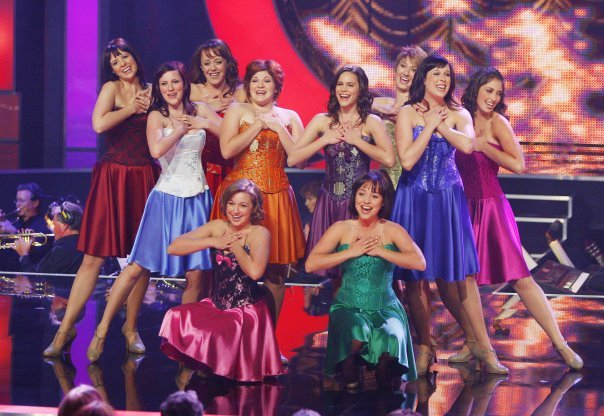 How do you make a great reality competition? R-E-S-P-E-C-T
How do you make a great reality competition? R-E-S-P-E-C-T
By Ed Martin
This has been an extraordinarily satisfying year for fans of reality TV.
Powered by more dazzling Top 10 talent than in any previous season and one of the most exciting finales in its history, American Idol demonstrated once again why it deserves to be the most popular program on television. Dancing with the Stars also outdid itself on the talent front. The Amazing Race featured two unforgettable teammates -- Margie and her deaf son, Luke -- who became instant audience favorites. The Real World: Brooklyn was the MTV franchise's best effort in years, ending on a level of extreme duress as Iraq War veteran and disarming prankster Ryan learned that he had been called for a second tour of duty. And in perhaps the most surprising reality kick of all, Celebrity Apprentice, in its final episodes, became essential Must-See TV, as legendary comedian Joan Rivers locked horns with poker champ Annie Duke for an extended take-no-prisoners conflict.
More recently, America's Got Talent has in only a few short weeks identified many likely finalists (including several exceedingly gifted kids) and one very humble contestant (chicken catcher and aspiring country singer Kevin Skinner) who evoked memories of Britain's Got Talent internet sensation Susan Boyle. So You Think You Can Dance is also having a splendid season.
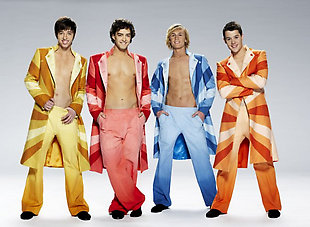 But off to the side of all this marvelous American-made madness have been two British talent shows that have provided more consistent feel-good entertainment than any of the series mentioned above. Last spring, BBC America offered the American premiere of the 2007 reality hit Any Dream Will Do, in which young men competed for the title role in a production of Joseph and the Amazing Technicolor Dreamcoat that debuted in the West End later that year. Dream was actually a follow-up to the hit 2006 British search-for-a-star competition How Do You Solve a Problem Like Maria?, with young women competing for the lead role in a West End production of The Sound of Music.
But off to the side of all this marvelous American-made madness have been two British talent shows that have provided more consistent feel-good entertainment than any of the series mentioned above. Last spring, BBC America offered the American premiere of the 2007 reality hit Any Dream Will Do, in which young men competed for the title role in a production of Joseph and the Amazing Technicolor Dreamcoat that debuted in the West End later that year. Dream was actually a follow-up to the hit 2006 British search-for-a-star competition How Do You Solve a Problem Like Maria?, with young women competing for the lead role in a West End production of The Sound of Music.
Joseph completed its run on BBCA several weeks ago, and Maria has since inherited its Sunday time period (8-10 p.m. ET, with an 11 p.m. ET repeat), making for some delightful summer night viewing.
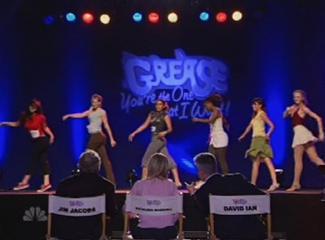 If the Maria/Dream format sounds familiar in a bad way, you may be having a flashback to You're the One That I Want, the abysmal 2007 NBC reality effort in which men and women competed for the lead roles of Danny and Sandy in a Broadway production of Grease. I suffered through most of You're the One, so my prior impression of this malleable franchise -- the brainchild of legendary composer and theatrical producer Andrew Lloyd Webber -- was not particularly positive. But I was floored by the talent on display when I first discovered Dream, and I am now happily hooked all over again on Maria.
If the Maria/Dream format sounds familiar in a bad way, you may be having a flashback to You're the One That I Want, the abysmal 2007 NBC reality effort in which men and women competed for the lead roles of Danny and Sandy in a Broadway production of Grease. I suffered through most of You're the One, so my prior impression of this malleable franchise -- the brainchild of legendary composer and theatrical producer Andrew Lloyd Webber -- was not particularly positive. But I was floored by the talent on display when I first discovered Dream, and I am now happily hooked all over again on Maria.
The full season of Maria was originally telecast in 2006, so it may seem like old business. But as they once said over at NBC, if you haven't seen it, it's new to you! The winner went on to star in a West End revival of The Sound of Music that ran for over two years. (Similarly, Any Dream winner Lee Mead enjoyed an 18-month run in Webber's West End revival of Joseph and the Amazing Technicolor Dreamcoat.) The Maria winner can be easily identified through a simple Google search, so if knowing the outcome is an issue for you, don't surf the web for anything related to this program.
Why all the enthusiasm? Maybe it's because the Maria contestants -- especially the five who remain -- could handily hold their own against any past or present Idol favorite (with the possible exceptions of Carrie Underwood and Kelly Clarkson). Unlike Idol, which always ends up with a few unaccountable clunkers in its Top 10, the finalists on Maria (like the Joseph finalists before them) have been uniformly great.
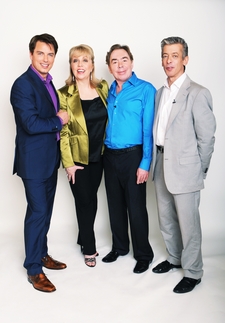
Indeed, it isn't just the super-talented contestants that have made these two shows more enjoyable than Idol. Andrew Lloyd Webber, the premier voice of authority and top judge on both, has given them a dramatic weight greater than that of Idol's four judges combined. The engaging experts who critique each performance -- actor, singer and Torchwood star John Barrowman, vocal coach Zoe Tyler, and theatrical producer David Ian on Maria; theatrical producer Bill Kenwright, actress Denise Van Outen, Barrowman and Tyler on Joseph -- have more interesting insights to offer than Randy Jackson, Paula Abdul, Kara DioGuardi and Simon Cowell and seem to take their jobs more seriously than their Idol counterparts.
And host Graham Norton, one of the most effortlessly engaging television personalities in the world, keeps everything moving at a brisk clip without any of those uncomfortable attempts at forced humor that compromise Idol main man Ryan Seacrest. Also, Norton's flashy suits and shirts add to the visual fun of these shows, something the increasingly drab Seacrest should consider.
Another reason Maria and Dream have worked so well is that the young singers on both have been uniformly respectful of the grown-up judges. Everything the professionals say matters. Cowell has often commented on the differences between the young people who appear on talent shows in England and those who snarl and growl their way through various American productions. The contestants on Maria and Dream are ecstatic when they succeed and crushed when they don't. Sometimes they become emotional when they are told that they will continue through to the following week. The contestants' honest displays of emotion add much more to the entertainment value of these programs than the often-snarky responses of some Idol contestants. Then again, maybe Lloyd Webber, Barrowman and their colleagues command more respect than Cowell and Co.
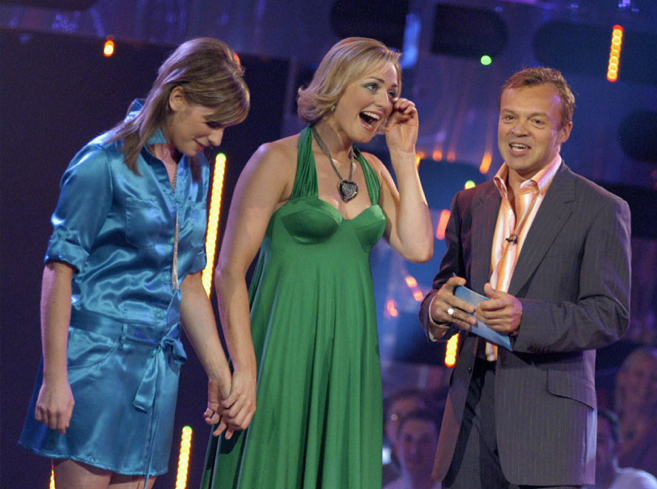 To put it simply, everything about these shows has worked, from the staging to the costumes to the music to the weekly climactic sing-offs, in which the bottom two vote-getters perform together and then wait for Webber to choose which one will survive and which must say goodbye. (On Joseph, elimination meant surrendering one's colorful coat. On Maria, the young ladies sing the classic So Long, Farewell from The Sound of Music as the eliminated Maria departs. Thankfully, she does not have to remove her colorful housemaid's dress.)
To put it simply, everything about these shows has worked, from the staging to the costumes to the music to the weekly climactic sing-offs, in which the bottom two vote-getters perform together and then wait for Webber to choose which one will survive and which must say goodbye. (On Joseph, elimination meant surrendering one's colorful coat. On Maria, the young ladies sing the classic So Long, Farewell from The Sound of Music as the eliminated Maria departs. Thankfully, she does not have to remove her colorful housemaid's dress.)
It may be that the producers of American Idol can learn a few things by watching How Do You Solve a Problem Like Maria? and Any Dream Will Do, but I think young people hoping to compete on future seasons of Idol (or any American talent show) can gain valuable insights from them, too.
----

Ed Martin is the television critic and programming analyst for the media industry Web site JackMyers.com. The former senior editor of the award-winning, much-missed television and advertising trade magazine Inside Media, Ed has also written for USA Today, Advertising Age, Television Week, Broadcasting & Cable and TV Guide.